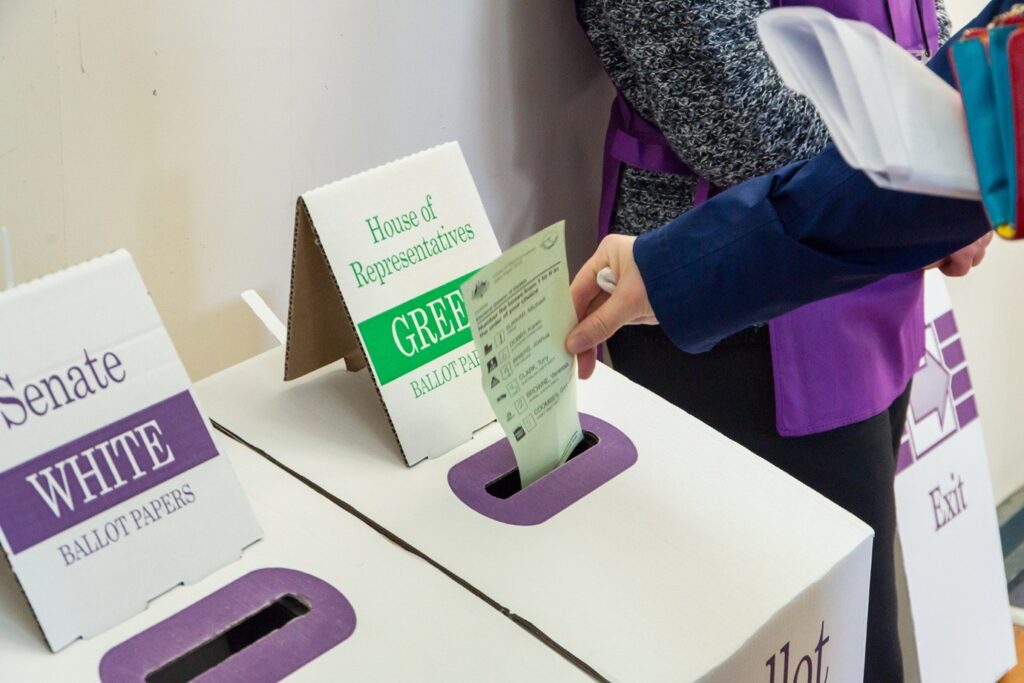On May 3, voters will go to the polls to elect their representatives, who will play a significant role in shaping the future for Australian women.
Some of the most urgent issues that the nation needs to address in order to achieve gender equity include eliminating all forms of violence against women, health and reproductive rights, housing and homelessness, early childhood education and care, and income adequacy and equality for women. This is according to analysis from the Women’s Electoral Lobby.
With so much at stake, women deserve to know where candidates stand on gender equity issues this election.
Here’s a deeper look into each party’s policies on the issues affecting women in Australia, according to the Women’s Electoral Lobby’s latest scorecard.
Domestic and sexual violence
Amid Australia’s crisis of violence against women, too many people are subjected to domestic and sexual violence without support.
The Albanese government has increased services and financial support for women and children escaping domestic violence, however further measures are required, such as resourcing specialist services, improving access to support for women on temporary visas and enabling experts to contribute to the national strategies.
Labor party
The Labor Party has partially committed to Fair Agenda‘s key policy reforms needed to address domestic violence.
The Women’s Electoral Lobby’s 2025 scorecard highlights that the ALP has provided $534.5 million over six years from 2024-25 to address the national crisis of gender-based violence and support the delivery of National Cabinet priorities.
The ALP has also allocated $6m to a program for innovative approaches to addressing perpetrator violence.
When it comes to sexual violence, Labor have driven critical reforms to address the issue in universities. Advocates have applauded this as transformative reform, however, the party has yet to commit to fund specialist sexual violence services to resource vital prevention and response work.
The Coalition
The Coalition has given limited commitments to Fair Agenda’s key policy reforms addressing sexual violence, and only just this week, they announced their first plans to address domestic violence, proposing a $90 million package.
This package includes a national domestic violence offender register for police and related agencies, as well as legislative reform targeting technology-facilitated abuse, fast-tracking simple property settlements for couples separating and measures for addressing financial abuse and bail reform.
The Coalition has committed to extending emergency payments to support women and children fleeing domestic violence as well as said they will ensure women’s and children’s safety will be enduring priorities. However, they have made no mention of establishing a national Prevention Innovation Fund, which experts say is critical to gathering information and developing programs on the most effective approaches to prevention of violence against women and their children.
The Greens
The Greens have given full commitment to Fair Agenda’s reform, which asks to address domestic and sexual violence.
They have pledged to fully fund the National Plan to End Violence Against Women and Children with $12 billion over 12 years. They will also increase funding for recovery services and raise the Escaping Violence Payment to better support survivors.
There is no mention in their policies of establishing a national Prevention Innovation Fund, however they have demanded that the National Plan be fully funded, which would capture such a program.
Minor parties
Fair Agenda’s pledge shows that the minor parties who have not given commitments to the reforms they say are needed to address either domestic and sexual violence include Australia’s Voice, Centre Alliance, Family First, Gerard Rennick People First, Jacqui Lambie Network, Katter Australia Party, Pauline Hanson’s One Nation and Trumpet of Patriots.
Having pledged full commitment is David Pockock Party, Legalise Cannabis Party and Socialist Alliance. The Sustainable Australia Party has given full commitment to key reforms addressing sexual violence and partial commitment to key reforms needed to address domestic violence.
Women’s health
Australian women deserve access to healthcare that respects agency over their bodies, lives and reproductive choices, but systemic barriers persist across the country, including high costs and dismissal of women’s pain.
Progress is needed in supporting training for primary care providers to address gender bias, improved access to contraceptives, investments into menopause research, improved access to abortion care and increased capacity for women’s health services.
Labor party
The Labor party has partially committed to key policies Fair Agenda say are needed to support women’s health and reproductive health.
When it comes to abortion care, the Federal Health Minister has stated that improving access is a state and territory matter.
The ALP has committed to a $573 million women’s health package focusing on reproductive and menopausal health.
The Coalition
The Coalition has partially committed to key policies Fair Agenda say are needed to support women’s health and reproductive health. They have announced plans to match Labor’s half-a-billion dollar women’s health plan.
The Coalition opposes a Human Rights Act based on a rejection of the Senate Inquiry Report recommendations. Australia is the only advanced OECD country without a Human Rights Act, and yet a legislated guarantee of the right to bodily autonomy alongside improved abortion laws could help secure women’s reproductive rights into the future.
The Greens
The Greens have fully committed to key policies Fair Agenda say are needed to support women’s health and reproductive health.
The Greens support an Australian Human Rights Act. They have also committed to improving abortion access through free public abortion care.
Minor parties
Fully committed to Fair Agenda’s key policies to support women’s health and reproductive health is the David Pocock Party, Legalise Cannabis Party, Socialist Party and the Sustainable Australia Party.
Fair Agenda’s pledge shows that the minor parties who have not given commitment to supporting key policies for women’s health and reproductive health include Australia’s Voice, Centre Alliance, Jacqui Lambie Network, Katter Australia Party and Trumpet of Patriots.
Pauline Hanson’s One Nation, Family First and Gerard Rennick People First’s public policy details on the issue of women’s health and reproductive health meet the “no commitment” scoring on Fair Agenda’s Pledge.
Care work
Australian society relies on the work of carers- the majority of whom are women. Their vital work often goes unrecognised and unpaid, despite the essential roles they play.
Strengthening our care system by investing in the workforce and structures of support are necessary areas of policy. This includes raising the pay of carers, improving child care access and ensuring the pipeline of the care workforce is adequately supported.
Labor party
The Labor party is partially committed to key policies Fair Agenda say are needed to recognise caring and care work.
The ALP has committed to dropping the controversial Activity test for every family earning up to $530,000 for 3 days/week capped flat fee childcare subsidy.
The Coalition
The Coalition has not committed to any of the key policies Fair Agenda says are needed to recognise caring and care work.
The Liberal party has said they’ll reinstate the controversial Activity Test. They also oppose Labor legislation on capped flat fee subsidy for three days per week for families earning up to $530,000/year.
The Greens
The Greens are fully committed to key policies Fair Agenda say are key to recognising caring and care work.
The Greens pledge to transition to a system that directly funds childcare providers. They will also invest over $9 billion per year on average to provide 50 hours a week of free early learning and care for every child.
Minor parties
The parties who have said they fully commit to Fair Agenda’s policy asking to recognise caring and care work include the David Pocock Party, Legalise Cannabis party, Socialist Alliance and Sustainable Australia party.
Those that have given no commitment as related to Fair Agenda’s Pledge include Australia’s Voice, Centre Alliance, Family First, Gerard Rennick People First, Jacqui Lambie Network, Katter Australia Party, Pauline Hanson’s One Nation and Trumpet of Patriots.
Housing
Too many women in Australia are struggling to make ends meet in the cost-of-living crisis.
Women are particularly vulnerable to housing insecurity, and older women are the fastest growing group of Australians facing homelessness.
The next parliament will need to address some key areas to improve housing, including raising the rate of income support, increasing the Remote Area allowance to support First Nations families, funding homelessness services and expanding access to specialist social security legal services, according to Fair Agenda.
Labor party
The Labor party has given limited commitment to Fair Agenda’s key policy asks to support those doing it tough.
Labor’s commitments include $10bn to build 100,000 new homes across the country, which would be reserved for first home buyers, and measures to help first home buyers with a five per cent deposit to avoid lender’s mortgage insurance.
The Coalition
The Coalition have given no commitments to Fair Agenda’s key policy asks to support those doing it tough.
The Coalition has pledged to allow first home buyers to access their super early to help fund their home ownership dreams. They’ve committed to letting first home buyers withdraw $50,000 from their superannuation to purchase their first property. This policy may disadvantage women, who typically have lower superannuation balances than men, and less savings by the time they reach retirement.
The Coalition has also announced a plan to allow first-time buyers of newly built homes to be able to deduct interest payments on up to $650,000 of their mortgage from their income taxes.
Additionally, the Coalition pledged $5 billion to support the construction of essential infrastructure, such as water, power, sewerage, and access roads, for new housing.
The Greens
The Greens have fully committed to supporting those doing it tough.
The Greens’ policy is to deliver 610,000 affordable homes over the next decade by establishing a federally owned public property developer to rent and sell homes below market prices
Minor parties
Legalise Cannabis, Socialist Alliance and Sustainable Australia Party have all fully committed to Fair Agenda’s key policy asks to support those doing it tough. Australia’s Voice has policies that deliver progress against some of those policies, and David Pocock Party has given partial commitment to Fair Agenda’s key policy asks in this area.
The minor parties who have not committed to supporting these key reforms for those doing it tough include Centre Alliance, Family First, Gerard Rennick People First, Jacqui Lambie Network, Katter Australia Party, Pauline Hanson’s One Nation and Trumpet of Patriots.
Become a Women’s Agenda Foundation member and support our work! We are 100% independent and women-owned. Every day, we cover the news from a women’s perspective, advocating for women’s safety, economic security, health and opportunities. Foundation memberships are currently just $5 a month.
Bonus: you’ll receive our weekly editor’s wrap of the key stories to know every Saturday.


